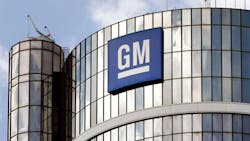General Motors to Close Australian Plants by 2017
SYDNEY -- General Motors (IW 500/5) said Wednesday it will close its Holden plants in Australia by 2017.
Holden, maker of the iconic Commodore car, said 2,900 jobs would be axed over the next four years -- 1,600 from its Elizabeth vehicle manufacturing plant in Adelaide and approximately 1,300 from Holden's workforce in Melbourne.
GM chief Dan Akerson said the decision to shutter Holden's Australian operations reflected a "perfect storm of negative influences the automotive industry faces in the country."
"This includes the sustained strength of the Australian dollar, high cost of production, small domestic market and arguably the most competitive and fragmented auto market in the world," he said.
It spells the end of a long association with Australia. The company began as a saddlery in 1856 and first started manufacturing cars locally in 1948.
The auto industry in Australia is at risk. In May Ford said it would stop making vehicles at its unprofitable Australian factories in 2016, with the loss of 1,200 jobs.
And with Mitsubishi have closed its Adelaide plant five years ago, only Toyota Australia -- which employs more than 4,000 workers -- will be left making cars in the country.
Even that appeared uncertain, as Toyota immediately announcing a review of its own position in Australia.
"This will place unprecedented pressure on the local supplier network and our ability to build cars in Australia," Toyota Australia said in a statement about Holden's closure.
"We will now work with our suppliers, key stakeholders and the government to determine our next steps and whether we can continue operating as the sole vehicle manufacturer in Australia."
The Australian Manufacturing Workers Union said it expected Toyota to follow Holden's lead.
"It's now highly likely that Toyota will leave Australia. In fact it's almost certain," AMWU national vehicles division secretary Dave Smith said.
"It's a very bleak day indeed."
Unions have warned of a multi-billion-dollar hole in the economy and the loss of up to 50,000 automotive industry-related jobs if car manufacturing in Australia ends altogether, with analysts saying Holden's departure could see the entire manufacturing industry collapse.
"This could possibly lead to the demise of the remaining manufacturing sector, leaving the Australian economy vulnerable when the mining boom inevitably ends," said Sydney University manufacturing experts Stephen Clibborn and Russell Lansbury.
Treasurer Joe Hockey said the government would work closely with the state governments and unions to ensure Holden's departure "does not lead to a significant economic downturn in South Australia or Victoria."
Australia's auto industry has struggled against a high dollar for years and Canberra extended an Aus$3.2 billion bailout to the sector at the height of the global financial crisis.
The announcement by Holden follows debate over whether the Tony Abbott-led government should provide more subsidies to the company to keep its doors open or let market forces take their course.
Holden chairman Mike Devereux said the priority over the next four years would be to ensure the best possible transition for workers in South Australia and Victoria.
"This has been a difficult decision given Holden's long and proud history of building vehicles in Australia," he said.
South Australia's peak retail automotive business group, the Motor Trade Association of South Australia, lashed out at the government for not doing more to ensure Holden remained in Australia.
"The federal government could have prevented this decision by Holden to close," said chief executive John Chapman.
"Without any certainty of federal support for the industry, the parent company General Motors have weighed up the costs and decided that it's just too expensive to manufacture Holdens in Australia.
"Our attention must now go to those component manufacturers and Toyota, and the federal government must immediately begin working on plans to keep this important manufacturing base in Australia."
-Martin Parry, AFP
Copyright Agence France-Presse, 2013
About the Author
Agence France-Presse
Copyright Agence France-Presse, 2002-2025. AFP text, photos, graphics and logos shall not be reproduced, published, broadcast, rewritten for broadcast or publication or redistributed directly or indirectly in any medium. AFP shall not be held liable for any delays, inaccuracies, errors or omissions in any AFP content, or for any actions taken in consequence.
